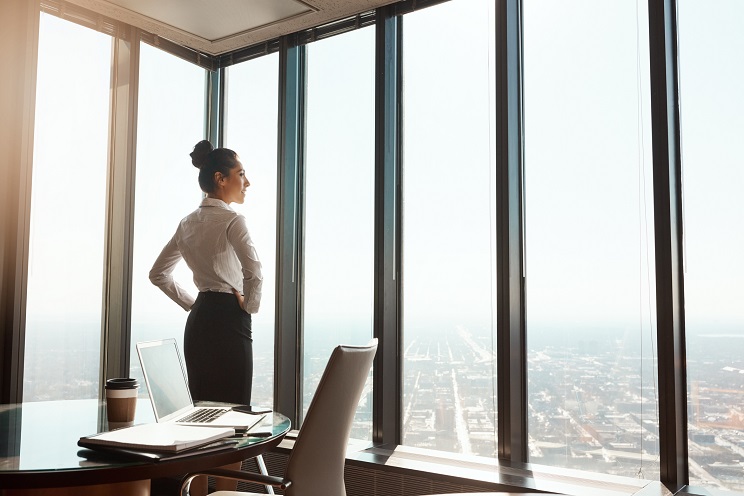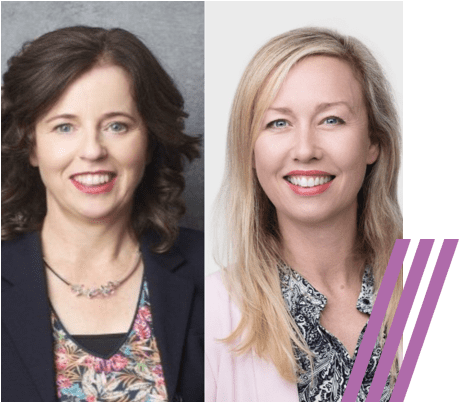A New Vision for Sustainability
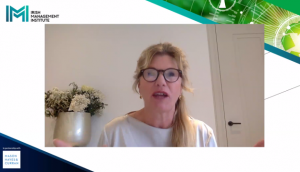
This year, global thought leader on sustainability, Marga Hoek, delivered a Masterclass for the IMI on A New Vision for Sustainability. During the event, delivered in partnership with Mason Hayes & Curran, Marga shared insights on why bold leadership is the blueprint for change and how leaders can deliver on sustainability goal while adding value to their businesses. Read all of Marga’s key insights now.
Following the Masterclass, Dr. Marguerite Nyhan of the Environmental Research Institute (ERI, UCC) joined Marga and a panel of local sustainability experts to discuss the challenges and opportunities that lie ahead for Irish businesses in this space.
Read on for the panellists’ thoughts on implementing sustainable practices, the business impact of such practices and how their organisations are planning for the future.
Michael Patten, Chief HR, ESG and Corporate Affairs Officer, Glanbia
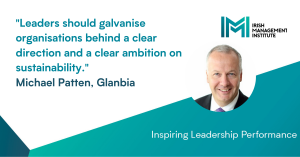
Could you comment on the challenges for senior teams in terms of developing and implementing strategies relating to sustainability?
“Public companies ultimately face multiple challenges side by side. We are an important converter into monetisation for our supply chains. In our case, that includes farmers, who have a lot at stake here. You have scrutiny for performance; your shareholders expect to see results every year. Your customers expect to see adaptation at least or no cost. These are challenges companies need to face while staying on the front foot of sustainability. We have been challenging ourselves – how do we change the mindset in ourselves as leaders and across the organisation to see that the world of climate change is the new world. There is no plan B. How do you turn that into first-mover advantage?
In terms of the critical challenges, the first is that your stakeholder set want it done yesterday. In reality, working in a very large organisation with a global footprint, it will take time. You can have the strategy, but we are in the food business and whatever else we do in the world, we still have to eat. In terms of decarbonisation, the first 50% of the journey is clear: that is the execution. The real challenge becomes the second 50%; by the end of 2030 when we’ve achieved the first round, how do you move it on when the technologies are new and unexplored? The other piece is that large organisations successfully run on processes; they have cycles they go through. Those cycles, by their nature, can create inertia because ‘that’s how things are done’. To embed sustainability, leadership must come from the top. Our board is very engaged with this agenda.”
What role does leadership play in terms of sustainability? What core lessons should we learn?
“Leadership is a skill that applies to sustainability as it does to most parts of an organisation. Leaders should galvanise organisations behind a clear direction and a clear ambition. Being clear about your ambition is important: you first need to know where you need to get to. Our direction is about joining forces with industries to meet the Paris targets. We recognise on that journey there will be various iterations. What’s important is we bring all our staff with us so they can make a contribution. Purpose is very important and people rally behind it. It’s about trying to get onto that front foot. Communication, vision and ambition are really important. Getting behind the urgency is crucial, too.”
Nicola Woods, Chief Transformation Officer, An Post
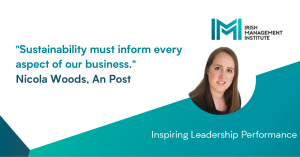
Where does sustainability fit into the overall transformation agenda at An Post?
“Because we’re one of the largest employers in Ireland and we have one of the largest fleets in Ireland, it’s important that we leave a positive mark and minimise our ecological footprint wherever possible. That is at the core of our purpose: to act for the common good and improve quality of life in Ireland now and for generations to come. To achieve that, sustainability must inform every aspect of our business. That sometimes means looking beyond our immediate commercial considerations and more towards our long-term strategy. When we looked at how to deal with the exponential growth in e-commerce and parcels that needed to be delivered, and what vehicles we used to deliver these parcels, we looked at both diesel and electric options. Diesel, though less expensive, wasn’t the right one for the citizens we are serving. Sustainability is at the heart of everything we do and that’s why the purchase of electric vehicles was both right for us as a business as well as for the citizens of Ireland.”
What are the business impacts you are seeing from your sustainability initiatives?
“We’re seeing incredibly positive results. We’ve put a lot of effort into being open and transparent, sharing our journey with other companies and our customers. For us, making sustainable living commonplace for the citizens of Ireland is just as, if not more important, than our internal sustainability initiatives. So, whilst internally we’re looking at retrofitting our commercial property portfolio, we’re also helping citizens to access finance and trusted advisors and suppliers to retrofit their own homes through products such as our Green Hub. That has resulted in unforeseen business benefits for us. For example, in the latest RepTrak Sustainability Index, we are ranked in the top three sustainable organisations in Ireland. We’ve also seen some competitive advantages when we are doing tender responses, as many companies are now looking for suppliers that follow responsible and sustainable business practices; that gives us an edge. Another benefit we are seeing is employee retention, as a result of our commitment to providing all of our employees with secure careers and opportunities for professional development.”
What are the challenges?
“Depending on where you are on the journey to sustainability, the challenges you face can be quite different. If you are at the beginning of your sustainability journey, and don’t know where to start, looking at Sustainable Development Goals can simplify the process for you. If you’re further down the track and already reporting on sustainability, assurance and auditing of sustainability going forward is going to be a challenge. Whilst we are already reporting across a number of different frameworks, reporting is maturing and we have decided to adopt additional frameworks this year, in order to start preparing for the full assurance that will be required by 2024 under the Corporate Sustainability Reporting Directive.”
Eoin Cassidy, Partner and Energy Sector Lead, Mason Hayes and Curran
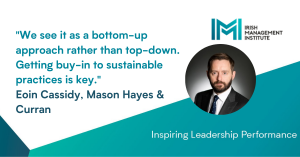
Comment on how sustainability has impacted on your organisation
“It’s no longer optional for companies to demonstrate their sustainable credentials if they want to attract and retain the right people. In our case, we don’t generate or produce products, so what we try to do is change the behaviours of staff. Every year, law firms bring in new blood, which are essential for the growth of the business. As they should, these individuals fully expect businesses to play their part in decarbonising the economy. You have to achieve the benchmark of sustainable practices. The differentiating factor is that it is done in an inclusive and collaborative way. Sustainability has changed the way in which we’ve approached team and work practices. We’ve created a green month committee of initiatives, for example. We see it as a bottom-up approach rather than top-down. Getting people to buy in to sustainable practices is key.”
What lessons have you learned to this point?
“It is about enduring behavioural change. We need to change how the 500-odd people in our business act. Mason Hayes & Curran has been committed to sustainable practices over the years. The real catalyst was an annual green month event where consisting of educational talks and workshops. Everyone from the business is involved. The aim of the committee is to implement new changes that will last.”




